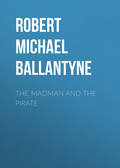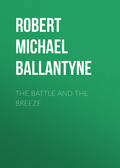
Robert Michael Ballantyne
The Fugitives: The Tyrant Queen of Madagascar
Chapter Twenty Three.
In which Mark carries out his Plans successfully, and powerfully astonishes himself as well as every one else
It was a brilliant lovely morning when the guests began to wend their way to the suburban residence of Anosy, where Ranavalona was to hold her garden party.
The people were very gay, somewhat excited, and very chatty, for they were aware that the young English doctor had prepared something new and surprising for the Queen’s special benefit.
Just before the earliest of these guests, however, had set off to the garden, our three heroes had passed down to that part of the road where the four slaves were already at work with pick and shovel and clanking chain.
It was a little after sunrise when Mark went up to the guard to relieve him.
“Take care,” said the guard, when about to leave, “that you keep the slaves well out of the way when the Queen passes. All the others in the neighbourhood have been taken off long ago. I was beginning to be afraid you would not come in time.”
“I understand,” said Mark, who knew enough of the language, (and also of the situation), to follow the drift of his meaning.
The guard thereupon turned, shouldered his musket, and went off, apparently well pleased at the unexpected relief from duty.
While this little incident was occurring three of the slaves were looking on with a slight expression of surprise in their sad faces. The fourth, Mamba, was standing in a dejected attitude before Hockins and Ebony, holding a pick in one hand and his heavy chain in the other.
“Oh! man, I am sorry to see you like this,” said Hockins, extending his brawny hand, “an’ I does wish I could set you free—but you know I’m as helpless as a babby in this matter.”
Mamba dropped the pick and grasped the strong hand, but did not look up. His heart was too full. He did not understand the seaman’s words, but he understood the tone. If he had looked up he would have seen that the tears were hopping over Ebony’s cheeks in spite of the powerful efforts of that sympathetic soul to control them, and that he was unable to speak because of a lump in his throat.
“Das most awrful!” he exclaimed at last. “Oh, Mamby, I’d fight for you like a wild-cat wid the cholera if that would do you any good, but it would be ob no use.”
Just then Mark came forward. “Quick, follow me,” he said, leading the way to a thick clump of bushes behind a wall that bordered the road. Here, quite concealed, yet able to peep through the leafy screen, he ordered his party to sit down on a heap of stones and await orders. He then went to the top of a mound that lay immediately behind them. From this he could see the road winding along for about two or three hundred yards.
Descending to his comrades he sat down beside them.
“You look anxious, doctor,” remarked the seaman.
“I am anxious,” returned Mark, “I am on the point of making a great venture, and the results may be serious. But we are in God’s hands;” then, turning to Mamba, who looked at him with much curiosity and a gleam of hope on his intelligent face, “I have hope of success and have prayed for it.”
Mamba, whose knowledge of English was very slight, shook his head and looked puzzled.
“Have you forgotten, Mamba, the law of your land—that the criminal who looks upon the Queen is from that moment entitled to claim freedom? Ranavalona is to pass along this road in less than half-an-hour.”
Of course Mark said this in remarkably bad Malagasy, but Mamba understood. A gleam of intelligence shot into his swarthy visage, and his chest began to heave with strong emotion as he glared rather than gazed at the speaker. Not less surprised were Hockins and Ebony when Mark explained, for although they had indeed heard about the law in question they had forgotten it. After recovering the first shock, Mamba turned quickly and pointed to his three comrades in suffering.
“Yes, yes—I understand,” said Mark, “I shall set them free at the same time. Why not? The risk will not be increased.”
“A reg’lar jail-delivery!” murmured Hockins, as he drew in a long breath.
“Hush! they come!” cried Mark, crouching so as the more effectually to conceal himself, in which act he was quickly imitated by the others.
According to promise, Ranavalona had set out from her palace that morning without her wonted display and ceremonial, with only a few of her courtiers and a handful of troops around her. She did not, however, omit the scarlet umbrella of state, and it was this brilliant object which had attracted Mark’s attention.
When the procession had approached close to the place of concealment, Mark whispered “Now!” and ran to the top of the mound before referred to. The four slaves followed him. The summit gained they turned, lifted up their arms and chains, looked upon the Queen, and gave vent to the “oo!—oo!—oo!” which stands to the Malagasy in the place of a cheer. Recognising the importance of the event, Hockins and Ebony, unable to restrain themselves, gave vent to a hearty British hurrah!
At this interruption, the bearers of the royal palanquin or chair halted, the soldiers brought their muskets to the “ready,” and a dark frown overspread the features of the Queen.
Before the storm could burst, however, Mark descended the mound, went to the side of the chair, knelt on one knee, and exclaimed—
“Forgive, madam—forgive me!”
“This, then, is your doing,” replied the Queen, sternly, through the Secretary, who was at her side.
“It is, madam. I am guilty. If punishment must descend, I alone should bear it.”
There was something so modest, yet so fearless, in the youth’s tone and bearing, that the Queen’s brows relaxed a little.
“But why did you dare to interfere with my laws?” demanded Ranavalona, still angrily.
“I did not venture to interfere, madam,” returned Mark, humbly, “I did but use one law to neutralise another. One of these slaves is my friend. I think he would be very useful in helping me to-night with my magic fires!”
There was so much of cool presumption in thus quietly changing the subject, with such charming modesty of demeanour, too, that the Queen burst into a hearty laugh.
“Strike off his fetters,” she said, and gave the signal to her bearers to move on.
“Ay,” said Mark to the Secretary in an authoritative tone, “and also strike off the fetters of the other three!”
“You’ve got cheek for anything a’most, doctor,” said the amazed and amused seaman, as they fell into the procession, and followed the Queen to the pleasure-garden.
Here extensive preparations had been made for spending the day in games and festivities that far exceeded anything of the sort ever before attempted in that land. For Mark Breezy had not only an ingenious mind to devise, but an organising spirit to make use of the services of others in carrying out his plans.
When the guests were scattered about the grounds, after a good breakfast, enjoying the delightful shade of the trees, tempting the gold-fish in the lake with crumbs of food, and loitering among the by-paths, the young doctor made himself almost ubiquitous. Acting the double part of manager of the games and amusements, and private conspirator, he set an army of palace officials in motion, whom he pledged to secrecy, and led each to suppose that he was the prime mover in some plot that was to astonish and delight the Queen, in all which he was ably assisted by the Secretary. When he had thus stirred up, as it were, an air of mystery and expectation, he led the Secretary, Hockins, and Ebony, to a retired spot, and, bidding them sit down, gave them a brief address.
“You see,” he said, “the time has now come for me to explain to you more fully the plans and plots with which I have been engaged for some time past. And in doing so I would impress upon you, Mr Secretary, that I am placing my life in your hands; but I do so without fear, believing that you are a Christian and will not betray me.”
Mark paused and looked full at the Secretary, who said, “But you must remember that I can do nothing that will be disloyal to the Queen.”
“If you were persecuted by the Queen and threatened with death, would you consider it allowable to fly to the forests?”
“Yes—the Word of the Lord recommends that.”
“Would you consider it right to assist a fellow-Christian to fly?”
“Truly I would!”
“Well then, you will assist me this night, for I have spoken to Rafaravavy. My Malagasy words are few, but love does not require many words! She has agreed to fly with Ravonino—”
“Have you seen Ravonino lately?” asked Hockins.
“No—I have not seen him lately.”
“How, then, do you know he will be ready?”
“Because,” said Mark, with a peculiar look, “I have been smitten with his complaint, and know that it runs the same course and exhibits the same phases in most men. Let a young fellow see his intended bride treated with cruelty, and you may be sure that, no matter what difficulties may be in the way, he will hasten at the very first opportunity to meet and carry off the sweet little fairy in spite of—”
“Das me an’ my black darlin’, zactly—same zif you bin dar an’ sawd us do it!” exclaimed Ebony, with beaming interest.
“Just so,” resumed Mark. “However, I have not left things altogether to chance. Although I did not see Ravonino lately, I saw him not very long ago, and gave him to understand that when some unusual festivities were going on in this garden he was to be ready at the old spot for whatever might happen! Now, here is my little plan. You know I’ve been drilling fifty picked natives for some time in that big shed at the back of the cliff on the north side o’ the city. I picked them for intelligence as well as strength and activity. Well, I have taught them a wild war-dance. It cost me no little trouble and many sleepless nights to invent it, but I’ve managed it, and hope to show the Queen and Court what can be done by a little organisation. These fifty are first of all to glide quietly among the trees, each man to a particular spot and hang on the branches fifty earthen saucers full of grease, with wicks in them. At a given signal they are to light these instantaneously and retire. At another signal they are to rush upon the open space in front of the garden-house, and there engage in a sham fight. While thus engaged, men who have been taught will set fire to the mildest of our fireworks. When these are about to go out I will myself light the big Roman candle—”
“De young cannon, massa?”
“Yes, the young cannon, and that will keep things going for a considerable time. Now, it is when the fight of the fifty begins and engrosses the attention of every one that I will myself take Rafaravavy out from among the ladies and lead her to the rendezvous. You will all stand by—to lend a hand if need be—at the south-east corner of the garden-house, that I may know exactly where to find you. My hope and expectation is that by keeping things going as long as possible our friends Ravonino and Rafaravavy will get a good start. After the flight of the latter is found out, nothing more can be done for them.”
“Do they go all alone?” asked Hockins.
“No, Laihova goes with them; and Mamba, who knows the secret meeting-places of the Christians, will, I have no doubt, soon find out which way they have gone. Anyhow they will all certainly make for the cave in Betsilio-land where so many of their friends are. May God speed them! Meanwhile we must keep the Queen amused with races, wrestling, and such-like; and when she begins to get wearied with mere eating and talking, I want you, Hockins, to go in for a wrestling-match with Ebony by way of varying the entertainment, and showing them what Englishmen and niggers can do.”
“Wery good,” said the seaman, with a sedate smile, “if that’s to be the fun, you better make your will, Ebony, for I’ll break your back.”
“All right,” retorted Ebony, with a grin, “an’ I tink you’ll be wise to make your last dyin’ speech afore we begin, for I’ll bust you!”
The various plans which we have here sketched were carried out with such brilliant success that the Queen did not weary at all, and darkness began to descend on the scene before the day seemed to have half run its course. At this point Mark hastened to the south-east corner of the garden-house, where he found the other conspirators faithfully at their post.
“Have you the flageolet with you?” he asked, hastily.
“In course I has. Never goes nowheres without it,” said the seaman, drawing the little instrument from his breast-pocket.
“Go then, make your bow to the Queen, and give her a tune. You know she’s quite in love with your pipe—or yourself—and has been asking me about it already. She’s in the verandah just now, and they are lighting the torches there.”
With the silent obedience of a man-of-war’s man, Hockins went off, and, without prelude, began. Dead silence was the instant result, for the small bird-like pipe seemed to charm the very soul of every one who heard it. We know not whether it was accident or a spice of humour in the seaman, but the tune he played was “Jock o’ Hazeldean!” And as Mark hurried off to see that his fifty men were in readiness, he gave vent to a slight laugh as he thought of the lines:
“She’s ower the border and awa’
Wi’ Jock o’ Hazeldean!”
To the surprise of the audience, no sooner had the last notes of the air died away than the performer thrust the pipe into his pocket, threw off his coat, and in a loud voice challenged the best man in Madagascar to wrestle with him. As the challenge was given in English of course no native responded. Even if it had been given in choice Malagasy we question whether any brown man there would have ventured a hug with the huge sailor. But no sooner had the challenge passed his lips than Ebony sprang forward, flung off not only his coat but his vest and shirt, and embraced his white opponent in a grip of iron.
At that opportune moment the signal was given to the fifty men, who applied their lights, and, as if by magic, the entire scene was illuminated by a blaze of intense light that almost rivalled that of the sun itself!
A tremendous “oo!—oo!—oo!” of applause burst from the astonished company, who, having had their attention fixed on the wrestlers, did not observe how the sudden illumination had been effected.
Truly the proceedings of Hockins and Ebony would have surprised even more finished wrestlers than those of Madagascar, for the two men had entered into a sly compact not only to exert their strength to the uttermost, but to give way, each at certain points or moments, when by so doing the appearance of what they styled a “back-breaker” and a “buster” might be achieved in an effective manner. It was a marvellous exhibition. Ebony glared and gasped! Hockins growled and frowned! Nothing short of a tussle between Achilles and Hercules could have equalled it. The Court, from the Queen downwards, was awe-stricken, eye-strained, open-mouthed, and breathless, but Mark felt that it was time to cut it short. Giving a preconcerted signal, he caused both men to fall down side by side as if exhausted but not conquered. Then he gave another signal. A moment after, fire-wheels and Roman candles began to play, and the fifty warriors rushed upon the scene, brandishing muskets and yelling like fiends.
Hastening, according to orders, to the south-east corner of the garden-house, Hockins and Ebony found the Director-General awaiting them.
“I cannot delay to fire the big candle,” he said quickly.
“De young cannon!” panted Ebony.
“Yes, yes. You must fire it for me in about ten minutes or so, when the warriors seem to be getting knocked up. Follow me, Hockins, and keep close.”
Another minute and Rafaravavy, who was standing near the Queen’s chair, felt a touch on her arm. She looked round with a start, for, like every one else, she had been fascinated and quite engrossed by the scene before her.
A glance and motion of the hand from Mark sufficed. She glided gently backwards and reached the other side of the house unobserved. Here Mark grasped her hand and Hockins followed. They walked at first, but began to run on gaining the shrubbery, which was rendered doubly dark by contrast with the glare behind them.
In a couple of minutes they reached the thicket where the previous meeting had taken place. The over-arching foliage deepened the darkness so that it was impossible to distinguish features. A form was dimly seen, but it was only by the sound of the voice that they knew it to be Ravonino.
Few words were uttered. Every instant was precious.
“Farewell, dear friend,” said Ravonino, grasping Mark’s hand, “God grant that we may meet again in better times! Laihova waits for me beyond the garden—”
He stopped abruptly, seized Rafaravavy’s hand and glided with her noiselessly into the thicket, for at that moment another figure was seen to approach them. From his unusual size they knew him to be one of Ranavalona’s chief executioners. He was a cool-headed and suspicious man, a sort of natural detective, who always had his wits about him. Having observed several people gliding through the shrubbery he had quitted the sports and followed. To have been recognised by this official would have been fatal—at least to those plotters who did not take to flight. Hockins, who was prompt to conceive and act when danger pressed, at once stepped forward and gave the man of blood a right-hander on the top of the nose which instantly Romanised that feature and laid its owner on his back insensible.
At the same moment—as if the blow had been the touching of a secret spring—the whole garden was lighted up with a magnificent red glare, and they knew that Ebony had done his part and lighted the giant candle. The red glare lasted long enough to reveal the fact that Ravonino and Rafaravavy were gone, and that the man at their feet was indeed the executioner whom they had guessed him to be. Leaving him there they ran quickly back to the scene of festivities, hoping that their absence had not been observed. Before they had gone half-a-dozen steps there was an explosion like that of a big gun, a bomb went high into the air, and burst in a magnificent constellation of brilliant stars, mingled with fiery rain. The “oo!—oo!—oo!” cheers became vociferous at this, and were, if possible, still more enthusiastic when the red fire changed to a beautiful blue.
“Splendid!” exclaimed Mark, much satisfied with the result of his recent labours, “and it will keep going on for a considerable time yet.”
As he spoke there was a crash like the loudest thunder, and a momentary glare as of the brightest noon-light, which was followed by intense darkness, while the garden was shaken as if by an earthquake. Loud cries and shrieks were accompanied by the falling of a shower of dust and small stones. Evidently there had been a catastrophe, and the quaking conspirators hastened to the spot, half expecting to find the Queen and Court of Madagascar blown to atoms.
“The whole consarn’s busted up!” exclaimed Hockins, on coming in sight of the garden-house.
The seaman’s explanation was the true one. Owing to some inexplicable mistake in the loading of the monster Roman candle, fire had communicated somehow with the lowest charge, which was a good strong one, intended to propel a glorious mass of ingenious contrivances into the air and end the matter with an effective bang. As it turned out, the bang was ten times more effective, for it not only blew out the entire charge but burst the cast-iron case, and upturned tons of earth in which Mark had taken the precaution to bury the thing up to its neck.
At first the Queen, like her people, had got a severe fright; but, seeing that no one seemed to be hurt, she controlled her feelings, under the impression, no doubt, that the explosion was part of the programme.
“Have you got your whistle, Hockins?” asked Mark, quickly, as he ran forward.
“Ay, sir—always here, ready for action!”
“Come, then, play up when I give the word—something quieting. Hold on! Let’s do it sedately.”
By this time they had got within the circle of torchlight. Reducing their run to a smart walk the two friends advanced, as Mark had suggested, sedately, in front of the Queen, while the Secretary rejoined the circle of courtiers unperceived.
As they advanced they encountered Ebony with an unused Roman candle in each hand, and an expression of horror on his black face.
“Oh! massa—” he began.
“Hush! never mind! Follow me!” said Mark, in a peremptory whisper.
Another moment and the sweet tones of the flageolet silenced the noise of the excited throng, as Hockins stood before the Queen and played one of the sweetest of Scottish songs.
Mark placed Ebony behind his comrade, made him hold up the Roman candles, quietly lighted them both, and retired. Thus Hockins, much to his own surprise, found himself, in the midst of spouting fire, producing the melodious notes of “Afton Water!”
When the little candles exploded, our Director-General advanced to the royal chair and expressed a hope that the performances had given satisfaction.
This the Secretary—ever-ready in time of need—translated, and returned the answer that the Queen was charmed, after which the proceedings terminated, and Ranavalona returned to her palace to dream, no doubt, of fireworks and music instead of martyrdoms.
So engrossed was the whole Court with the exciting and singular events of the day that no one noticed the absence of Rafaravavy, and, happily, the Queen did not happen to require her attendance that night.
Even those who were in closest proximity to the fugitive’s own room were so taken up with what they had seen that they either did not think of her, or supposed that fatigue had induced her to retire early.
Thus it came to pass that when her flight was discovered on the following day, Rafaravavy, carried by strong and willing bearers, and guarded by her devoted Ravonino and his faithful friend Laihova, was being swiftly borne over mountain and plain to the forest stronghold in Betsilio-land.







